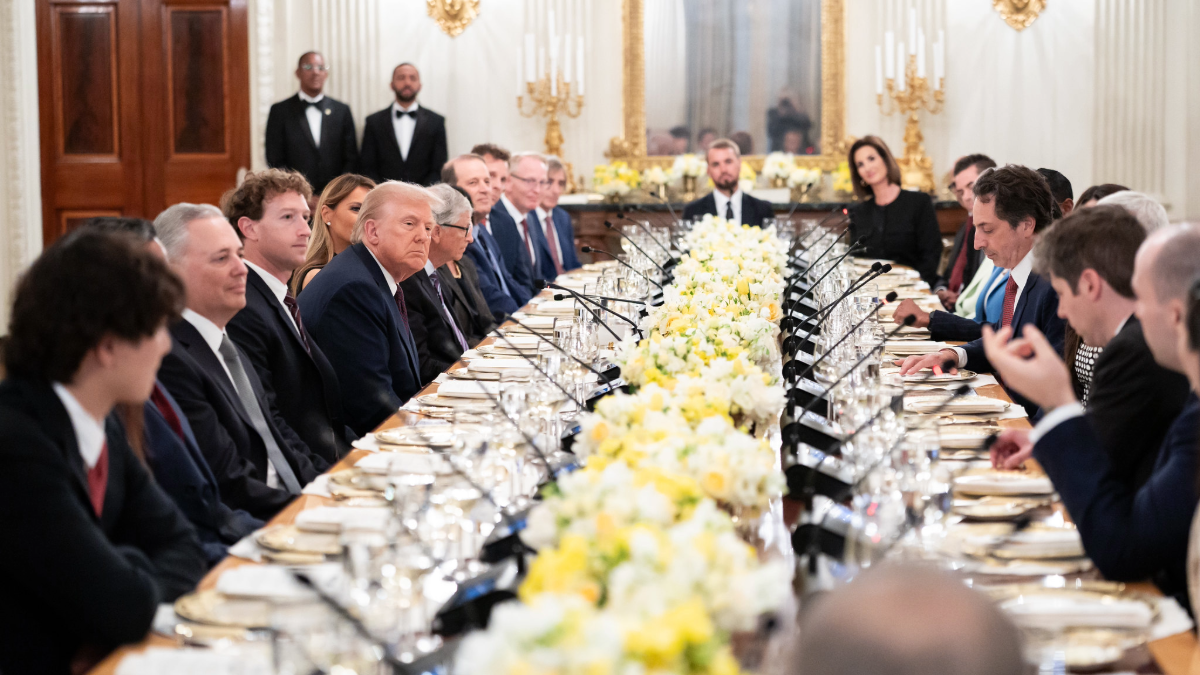Tech’s Love Affair with Trump Grows Stronger By the Day
Paul M. Barrett / Oct 23, 2025
President Donald Trump and First Lady Melania Trump host business and technology leaders for a dinner in State Dining Room at the White House, Thursday, September 4, 2025. (Official White House photo by Andrea Hanks)
Since the United States election in November 2024, the technology industry has distinguished itself in the race to capitulate to and enable the Trump administration. No gesture of obsequiousness or loyalty has been too great or trivial for the moguls of Silicon Valley.
In recent days:
- Representatives of Amazon, Apple, Google, and Microsoft attended a White House dinner where the president thanked wealthy donors to his project of adding a 90,000-square-foot ballroom to the Executive Mansion.
- Responding to administration demands, Meta, Apple, and Google restricted digital tools used by activists to flag sightings of masked Immigration and Customs Enforcement (ICE) agents seeking to arrest immigrants allegedly lacking legal status.
- Salesforce CEO Marc Benioff, once seen as a progressive benefactor, said in an interview that he avidly supports President Trump and believed National Guard troops should be deployed to his hometown of San Francisco, over the objections of city leaders. (He has since apologized for beckoning the Guard.) Benioff’s company, meanwhile, reportedly has pitched ICE on using Salesforce’s artificial intelligence to help the agency staff up as it expands immigration raids and deportations.
This trend began even before Trump’s victory last November. The president’s on-again, off-again ally Elon Musk played a leading role in financing Trump’s campaign, and Musk’s social media platform, X, became a major mouthpiece for the Make America Great Again movement.
As I’ve noted elsewhere, the tech industry has not always supported Trump’s disruptive brand of politics. In the wake of the January 6, 2021, attack on the US Capitol, tech CEOs — although not Musk — were prominent in the ranks of corporate leaders who condemned Trump, then wrapping up his first term, for inciting a violent attempt to overturn the results of a free and fair election. “The shocking events of the last 24 hours clearly demonstrate that President Donald Trump intends to use his remaining time in office to undermine the peaceful and lawful transition of power to his elected successor, Joe Biden,” Meta CEO Mark Zuckerberg wrote on Jan. 7, 2021, justifying what turned out to be Trump’s temporary banishment from Facebook. Trump’s “decision to use his platform to condone rather than condemn the actions of his supporters at the Capitol building,” Zuckerberg added, “has rightly disturbed people in the US and around the world.”
Change of heart
But since Trump’s defeat of Kamala Harris, Zuckerberg and the chief executives of other leading US technology companies, including Apple’s Tim Cook, Google’s Sundar Pichai and Microsoft’s Satya Nadella, all of whom publicly expressed disapproval of the Jan. 6 insurrection and the politicians who encouraged it, have rushed to congratulate the president-elect and hail opportunities to collaborate with his administration. Zuckerberg initiated a face-to-face meeting with Trump at Mar-a-Lago, his West Palm Beach, Florida, club, in November 2024, during which Meta’s chief executive reportedly extended warm wishes to his host upon re-taking the presidency.
Why has Silicon Valley’s ardor for Trump, The Sequel been so intense? Tech CEOs’ business goals are part of the answer. Google, Meta, Apple and Amazon are all in the midst of federal antitrust litigation that they doubtless hope Trump may influence. Musk’s rocket company, SpaceX, has billions of dollars in ongoing contracts with the US government and could benefit from closer federal ties.
As early as Nov. 21, 2024, Microsoft’s No. 2 executive, Brad Smith, told the trade publication The Information that his company would like to “engage with” the Trump administration — specifically that Microsoft’s AI products can help cut government spending and boost efficiency. “AI is probably one of the most helpful tools available to make government more efficient and less costly,” Smith said. “We could use a Manhattan Project just to put technology to more effective work to improve government across the board.”
It’s not clear whether Smith’s public sales pitch led to the incorporation of Microsoft AI in the work of Musk’s so-called Department of Government Efficiency (DOGE) or other widely reported Trump efforts to slash the federal workforce. But in September 2025, the US General Services Administration announced a “strategic partnership” with Microsoft under which the company “will provide discounts across its suite of cloud services, including: Microsoft 365, Copilot, Azure Cloud Services, Dynamics 365, as well as cybersecurity and monitoring tools, with potential savings of $3.1 billion in the first year.”
In some instances, tech companies are eager for Trump to fold their anti-regulatory agenda into his America First agenda — for example, by using US influence to reduce oversight by the European Union.
In a series of posts on Meta’s Threads platform in Jan. 2025, Zuckerberg framed his decision to roll back automated content moderation and eliminate third-party fact-checking on Facebook and Instagram as part of his plan to “work with President Trump to push back against foreign governments going after American companies to censor more.” In a video on the company’s website, Zuckerberg said that for the last four years (read: during the Biden administration), “governments and legacy media have pushed to censor more and more.” Trump’s return to power will reverse that development, he predicted in a celebratory vein. “The recent elections also feel like a cultural tipping point toward once again prioritizing speech,” he said. “So, we’re going to get back to our roots and focus on reducing mistakes and simplifying our policies and restoring free expression on our platforms.”
Not coincidentally, the supposed free expression Zuckerberg credits to Trump’s “cultural tipping point” is designed to unleash the kind of hateful, misogynistic, and anti-immigrant rhetoric associated with Trump and the MAGA movement. “We’re getting rid of a number of restrictions on topics like immigration, gender identity and gender that are the subject of frequent political discourse and debate,” Zuckerberg’s No. 2 executive, Joel Kaplan, explained in his own corporate blog post in January. “It’s not right that things can be said on TV or the floor of Congress, but not on our platforms.”
‘We had to endorse Trump’
Meta isn’t the only company to claim that it suffered under Biden. Silicon Valley venture capitalist Marc Andreessen said in a podcast last December that he and other tech figures had meetings with Biden officials that were “absolutely horrifying … we came out basically deciding that we had to endorse Trump.”
But according to Jacob Silverman, author of the newly released book Gilded Rage: Elon Musk and the Radicalization of Silicon Valley, the tech industry actually flourished under Biden, benefitting, for example, from increased cooperation with national security agencies. Silverman argues that tech leaders like Musk, Andreessen, Peter Thiel and David Sacks (now chair of the President's Council of Advisors on Science and Technology) found common ground with Trump on certain cultural issues, and realized that they could form symbiotic relationships with his administration.
A final factor deserves attention in explaining tech’s love affair with Trump: electricity. The industry needs enormous amounts of additional power to run its expanding data centers and other artificial intelligence infrastructure. Slaking this thirst for juice requires regulatory rollbacks, among other forms of government cooperation. Trump has paired this demand for huge amounts of electricity with his own push to expand US gas, coal and nuclear production.
In July, Trump announced a sweeping new plan for America’s “global dominance” in AI, proposing to cut back environmental regulations to speed up the construction of AI supercomputers while promoting the sale of US-made AI technologies. And he directly addressed the power issue. “We will be adding at least as much electric capacity as China,” he said. “Every company will be given the right to build their own power plant.”
What we can do
People disgusted by the tech industry’s obsequious stance toward an administration that with every passing day resembles more closely authoritarian regimes in nondemocratic countries can take steps to signal their dissent and fight back. Boycotts are one obvious tactic. Loudly quit Facebook, Instagram, X, and Amazon. There are costs to doing so, but political struggles demand sacrifice. Switching to BlueSky or shopping at Costco is probably manageable for most people.
A bigger ask is that employees of major tech companies should consider whether their jobs align with their values. Breadwinners with mortgages and college tuition bills can’t lightly resign on principle, but they shouldn’t blithely ignore their consciences, either. At some point, compartmentalization becomes untenable – or ought to.
Civil society organizations, think tanks, and educational institutions that take money from Silicon Valley should stop, and should explain why they are doing so publicly. Such groups, and prominent individuals within them, should condemn the capitulation the industry has exemplified.
The MAGA-led US Congress isn’t doing anything constructive at the moment. But states should continue to attempt to impose disclosure requirements and other regulatory demands, complicated as that task is by First Amendment limits on government oversight of companies in the business of transmitting expression. The European Union and other government bodies beyond the US should likewise persist in seeking to make the largely US-based tech industry more transparent and accountable.
These are not normal times. We cannot do business as usual. The tech industry is selling out to a dangerous political force. Those who favor democracy need to recognize what is happening and respond as best we can.
Authors
